副词的用法和习题讲解
(英语)初中英语副词解题技巧和训练方法及练习题(含答案)及解析

(英语)初中英语副词解题技巧和训练方法及练习题(含答案)及解析一、初中英语副词1.—He hardly had friends because he used to be mean.—But now he has changed a lot. He treats others ________ and is popular.A. nicelyB. carelesslyC. rudelyD. heavily【答案】 A【解析】【分析】句意:——他几乎没有朋友,因为他过去小气。
——但是现在他已经改变了很多。
他对每个人很好,很受欢迎。
A好地,B粗心地,C粗鲁地,D沉重地。
根据he used to be mean.他过去小气,和 But now he has changed a lot. 但是现在他已经改变了很多,可知他现在对别人应该是好地。
故选A。
【点评】考查副词辨析。
注意理解副词意思,根据所给语境选择合适的副词。
2.—Can you catch what I said?—Sorry,I can ______ understand it because you speak very quickly.A. almostB. probablyC. mostlyD. hardly【答案】 D【解析】【分析】句意:﹣你能领会我说的话吗?﹣对不起,我几乎听不懂因为你说得太快了。
almost几乎;probably可能;mostly主要地;hardly几乎不;根据sorry及because you speak very quickly可知对方几乎没听懂,故选D。
【点评】副词辨析,结合上下文意思选择合适的副词。
3.I've read through this book several times,but I will read it so as to get better understanding.()A. more bravelyB. less eaiilyC. less confidentlyD. more carefully【答案】 D【解析】【分析】这本书我通读了几遍,但是为了获得更好的理解我将更认真地阅读一次.A.more bravely 更勇敢地;B.less easily不那么容易地;C.less confidently不那么自信地;D.more carefully更认真地,更仔细地.根据后文so as to get better understanding 给的目的,这里说的是更认真地,更仔细地.故选D.4.—_______ is it from Suqian to Jiuzhai valley?—About 1,200 kilometers away. But I'm not sure.A. How oftenB. How soonC. How longD. How far【答案】 D【解析】【分析】句意:--从宿迁到九寨沟有多远?-大约1200公里远。
【英语】英语副词练习题及解析

【英语】英语副词练习题及解析一、单项选择副词1.Although she did not know Boston well, she made her way ________ to the Home Circle Building.A.easy enough B.enough easyC.easily enough D.enough easily【答案】C【解析】试题解析:考查enough用法。
enough修饰形容词,副词需要后置,副词easily修饰动词made. 此题需要注意的是,此处的to为介词,结构为make one’s way to someplace表示去某地,而不是make+宾语+形容词+不定式的结构。
句意:尽管她不是很了解波士顿,可她却能轻易找到去家居建筑圈的路。
故选C。
考点:考查enough用法。
2.She devoted herself ______ to her research and it earned her a good reputation in her field. A.strongly B.freely C.entirely D.extremely【答案】C【解析】考查副词辨析。
句意为:她将全部精力用于研究工作,这为她在这一领域赢得了良好的声誉。
entirely完全地,符合句意。
strongly强烈地;freely自由地;extremely极端地;极其;非常。
答案:C3.(乌鲁木齐高三年级第二次诊断性测验)I might fail,but________I insist on doing it.I never lose heart.A.someway B.anyhowC.then D.meanwhile【答案】B【解析】考查副词。
句意为:我也许会失败,但是无论怎样,我会坚持做的。
我永不灰心。
anyhow 无论如何,反正,符合句意。
A.用某种方法,不知为什么;C.然后;D.同时。
(英语)英语副词常见题型及答题技巧及练习题(含答案)
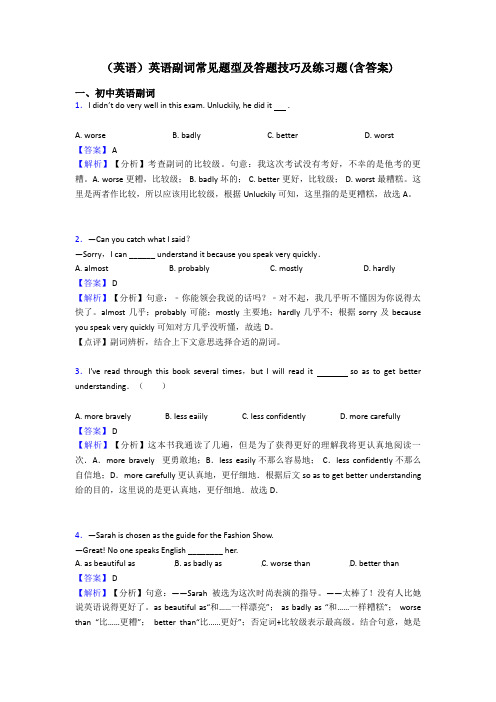
(英语)英语副词常见题型及答题技巧及练习题(含答案)一、初中英语副词1.I didn’t do very well in this exam. Unluckily, he did it .A. worseB. badlyC. betterD. worst【答案】 A【解析】【分析】考查副词的比较级。
句意:我这次考试没有考好,不幸的是他考的更糟。
A. worse更糟,比较级; B. badly坏的; C. better更好,比较级; D. worst最糟糕。
这里是两者作比较,所以应该用比较级,根据Unluckily可知,这里指的是更糟糕,故选A。
2.—Can you catch what I said?—Sorry,I can ______ understand it because you speak very quickly.A. almostB. probablyC. mostlyD. hardly【答案】 D【解析】【分析】句意:﹣你能领会我说的话吗?﹣对不起,我几乎听不懂因为你说得太快了。
almost几乎;probably可能;mostly主要地;hardly几乎不;根据sorry及because you speak very quickly可知对方几乎没听懂,故选D。
【点评】副词辨析,结合上下文意思选择合适的副词。
3.I've read through this book several times,but I will read it so as to get better understanding.()A. more bravelyB. less eaiilyC. less confidentlyD. more carefully【答案】 D【解析】【分析】这本书我通读了几遍,但是为了获得更好的理解我将更认真地阅读一次.A.more bravely 更勇敢地;B.less easily不那么容易地;C.less confidently不那么自信地;D.more carefully更认真地,更仔细地.根据后文so as to get better understanding 给的目的,这里说的是更认真地,更仔细地.故选D.4.—Sarah is chosen as the guide for the Fashion Show.—Great! No one speaks English ________ her.A. as beautiful asB. as badly asC. worse thanD. better than【答案】 D【解析】【分析】句意:——Sarah被选为这次时尚表演的指导。
英语副词练习题20篇及解析
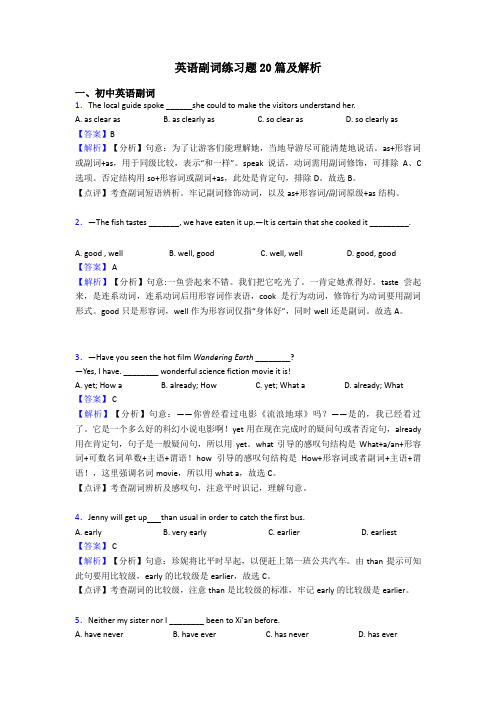
英语副词练习题20篇及解析一、初中英语副词1.The local guide spoke ______she could to make the visitors understand her.A. as clear asB. as clearly asC. so clear asD. so clearly as【答案】B【解析】【分析】句意:为了让游客们能理解她,当地导游尽可能清楚地说话。
as+形容词或副词+as,用于同级比较,表示“和一样”。
speak说话,动词需用副词修饰,可排除A、C 选项。
否定结构用so+形容词或副词+as,此处是肯定句,排除D。
故选B。
【点评】考查副词短语辨析。
牢记副词修饰动词,以及as+形容词/副词原级+as结构。
2.—The fish tastes _______, we have eaten it up.—It is certain that she cooked it _________.A. good , wellB. well, goodC. well, wellD. good, good【答案】 A【解析】【分析】句意:一鱼尝起来不错。
我们把它吃光了。
一肯定她煮得好。
taste尝起来,是连系动词,连系动词后用形容词作表语,cook是行为动词,修饰行为动词要用副词形式。
good只是形容词,well作为形容词仅指“身体好”,同时well还是副词。
故选A。
3.—Have you seen the hot film Wandering Earth ________?—Yes, I have. ________ wonderful science fiction movie it is!A. yet; How aB. already; HowC. yet; What aD. already; What 【答案】 C【解析】【分析】句意:——你曾经看过电影《流浪地球》吗?——是的,我已经看过了。
(英语)英语副词常见题型及答题技巧及练习题(含答案)含解析
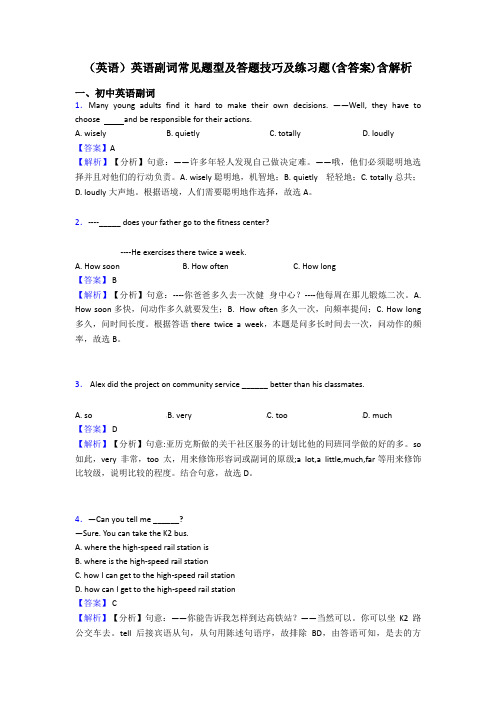
(英语)英语副词常见题型及答题技巧及练习题(含答案)含解析一、初中英语副词1.Many young adults find it hard to make their own decisions. ——Well, they have to choose and be responsible for their actions.A. wiselyB. quietlyC. totallyD. loudly【答案】A【解析】【分析】句意:——许多年轻人发现自己做决定难。
——哦,他们必须聪明地选择并且对他们的行动负责。
A. wisely 聪明地,机智地;B. quietly 轻轻地;C. totally总共;D. loudly大声地。
根据语境,人们需要聪明地作选择,故选A。
2.----_____ does your father go to the fitness center?----He exercises there twice a week.A. How soonB. How oftenC. How long【答案】 B【解析】【分析】句意:----你爸爸多久去一次健身中心?----他每周在那儿锻炼二次。
A. How soon多快,问动作多久就要发生;B. How often多久一次,向频率提问;C. How long 多久,问时间长度。
根据答语there twice a week,本题是问多长时间去一次,问动作的频率,故选B。
3. Alex did the project on community service ______ better than his classmates.A. soB. veryC. tooD. much【答案】 D【解析】【分析】句意:亚历克斯做的关干社区服务的计划比他的同班同学做的好的多。
so 如此,very 非常,too 太,用来修饰形容词或副词的原级;a lot,a little,much,far等用来修饰比较级,说明比较的程度。
(英语)英语副词解题技巧分析及练习题(含答案)及解析
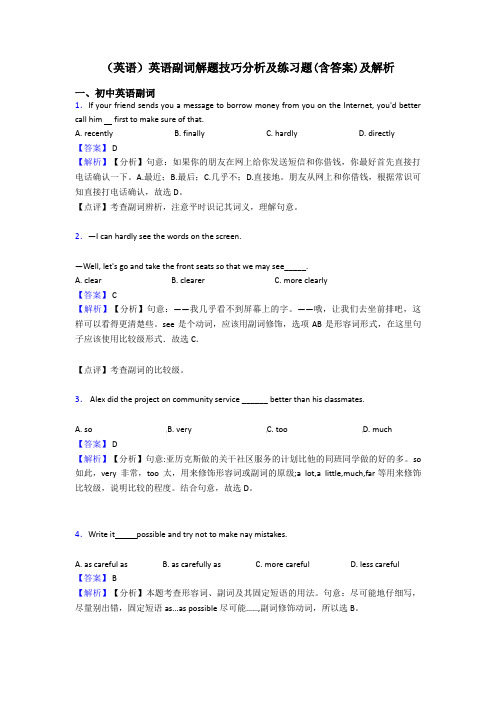
(英语)英语副词解题技巧分析及练习题(含答案)及解析一、初中英语副词1.If your friend sends you a message to borrow money from you on the Internet, you'd better call him first to make sure of that.A. recentlyB. finallyC. hardlyD. directly【答案】 D【解析】【分析】句意:如果你的朋友在网上给你发送短信和你借钱,你最好首先直接打电话确认一下。
A.最近;B.最后;C.几乎不;D.直接地。
朋友从网上和你借钱,根据常识可知直接打电话确认,故选D。
【点评】考查副词辨析,注意平时识记其词义,理解句意。
2.—I can hardly see the words on the screen.—Well, let's go and take the front seats so that we may see_____.A. clearB. clearerC. more clearly【答案】 C【解析】【分析】句意:——我几乎看不到屏幕上的字。
——哦,让我们去坐前排吧,这样可以看得更清楚些。
see是个动词,应该用副词修饰,选项AB是形容词形式,在这里句子应该使用比较级形式.故选C.【点评】考查副词的比较级。
3. Alex did the project on community service ______ better than his classmates.A. soB. veryC. tooD. much【答案】 D【解析】【分析】句意:亚历克斯做的关干社区服务的计划比他的同班同学做的好的多。
so 如此,very 非常,too 太,用来修饰形容词或副词的原级;a lot,a little,much,far等用来修饰比较级,说明比较的程度。
(英语)高一英语副词解题技巧及练习题及解析
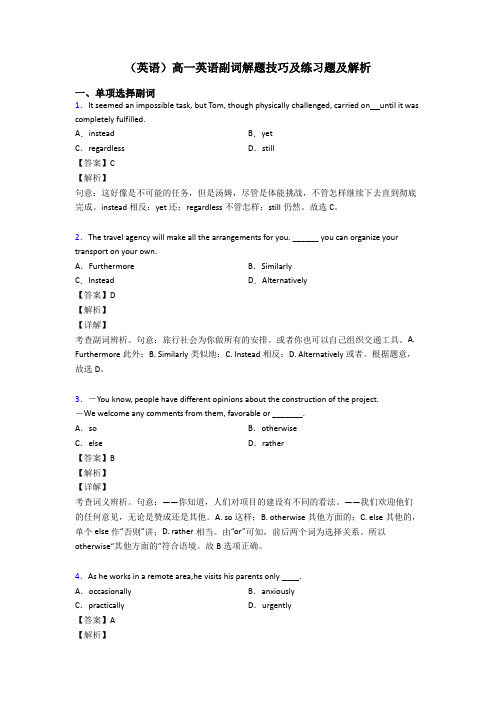
(英语)高一英语副词解题技巧及练习题及解析一、单项选择副词1.It seemed an impossible task, but Tom, though physically challenged, carried on until it was completely fulfilled.A.instead B.yetC.regardless D.still【答案】C【解析】句意:这好像是不可能的任务,但是汤姆,尽管是体能挑战,不管怎样继续下去直到彻底完成。
instead相反;yet还;regardless不管怎样;still仍然。
故选C。
2.The travel agency will make all the arrangements for you. ______ you can organize your transport on your own.A.Furthermore B.SimilarlyC.Instead D.Alternatively【答案】D【解析】【详解】考查副词辨析。
句意:旅行社会为你做所有的安排。
或者你也可以自己组织交通工具。
A. Furthermore此外;B. Similarly类似地;C. Instead相反;D. Alternatively或者。
根据题意,故选D。
3.-You know, people have different opinions about the construction of the project.-We welcome any comments from them, favorable or _______.A.so B.otherwiseC.else D.rather【答案】B【解析】【详解】考查词义辨析。
句意:——你知道,人们对项目的建设有不同的看法。
——我们欢迎他们的任何意见,无论是赞成还是其他。
A. so这样;B. otherwise其他方面的;C. else其他的,单个else作“否则”讲;D. rather相当。
【英语】副词知识点总结及经典习题(含答案)1

【英语】副词知识点总结及经典习题(含答案)1一、初中英语副词1.Lin Fang comes home ________ than before this term. She doesn't have so many classes in the afternoon.A. earlyB. earlierC. lateD. later【答案】 B【解析】【分析】early早期的,提前;earlier早的,初期的;早地;late迟的,晚的,最近;later后来,稍后,更迟的。
句意:林芳这个学期比以前回家早。
她在下午没有这么多课程。
结合语境可知本句中表示和以前的对比,故用副词的比较级,选B。
【点评】考查词语辨析2.—__________do you sleep every day, Eric?—For about eight hours.A. How muchB. How fastC. How oftenD. How long【答案】 D【解析】【分析】句意:——艾瑞克,你每天晚上睡多长时间?——大约八个小时。
A.多少;B.多快;C.多长时间一次;D.多长。
根据答语For about eight hours. 可知问句询问的是时间长短,对时间长短提问应使用how long,故答案是D。
【点评】考查疑问词辨析,根据答语确定疑问词的意思,从而选出正确答案。
3.Drivers should drive when they are passing by a school.A. terriblyB. quicklyC. slowlyD. freely【答案】 C【解析】【分析】考查副词辨析。
句意:当他们正经过学校时,司机开车应该开慢点。
A.可怕的地;B.快速地;C.慢慢地;D.自由地。
结合句意可知选C。
4.Jeff pleased everybody by making his dog walk ________.A. byB. overC. fromD. on【答案】D【解析】【分析】句意:杰夫通过让他的狗继续散步让大家高兴。
- 1、下载文档前请自行甄别文档内容的完整性,平台不提供额外的编辑、内容补充、找答案等附加服务。
- 2、"仅部分预览"的文档,不可在线预览部分如存在完整性等问题,可反馈申请退款(可完整预览的文档不适用该条件!)。
- 3、如文档侵犯您的权益,请联系客服反馈,我们会尽快为您处理(人工客服工作时间:9:00-18:30)。
1、副词的种类(1) 时间副词:ago, before, already, just, now, early, late, finally, tomorrow等(2) 地点副词:here, near, around, in, out, up, down, back, away, outside等(3) 方式副词:carefully, angrily, badly, calmly, loudly, politely, nervously等。
(4) 程度副词:almost, nearly, much, greatly, a bit, a little, hardly, so, very等。
2、基本用法:主要用来修饰动词,形容词,副词或其他结构。
一、副词的位置:1)在动词之前。
2)be、助动词之后。
3)多个助动词时,一般放在首个助动词后。
注意:a. 大多数方式副词位于句尾,但宾语过长,副词可以提前,使句子平衡。
We could see very clearly a strange light ahead of us.b. 方式副词well,badly糟、坏,hard等只放在句尾。
He speaks English well.二、副词的排列顺序:1)时间,地点副词,小单位的在前,大单位在后。
2)方式副词,短的在前,长的在后,并用and或but等连词连接。
Please write slowly and carefully.3)多个不同副词排列:程度+地点+方式+时间副词。
注意:very 可修饰形容词,但不能修饰动词。
改错:(错) I very like English. (对) I like English very much. 注意:副词enough要放在形容词的后面,形容词enough放在名词前后都可。
I don't know him well enough. There is enough food for everyone to eat.或There is food enough for everyone to eat.3、某些副词在用法上的区别(1) already, yet, stillalready表示某事物已经发生,主要用于肯定句;yet表示期待某事发生,主要用于否定句和疑问句;still表示某事还在进行,主要用于肯定句和疑问句,有时也可用于否定句。
如:We've already watched that film. I haven't finished my homework yet. He still works until late every night.(2) too, as well, also, eithertoo, as well和also用于肯定句和疑问句,too和as well多用于口语,一般放在句末,而also多用于书面语,一般放在句中与动词连用。
either用于否定句和否定的疑问句,往往放在句末。
如:He went there too. He didn't go there either. I like you as well. I also went there.(3) hard, hardlyhardly意为"几乎"与hard在词义上完全不同。
如:I work hard every day. I can hardly remember that.例1 Tom's father thinks he is already ____A high enoughB tall enoughC enough high C enough tall例2"I haven't been to London yet".————"I haven't been there ____".A tooB alsoC eitherD neither例3 Mr Smith was ____ moved at the news.A deepB deeplyC very deepD quite deeply频度副词的位置1)频度副词通常放在下面三个位置:a. 放在动词前面:They sometimes stay up all night. She never saw him again. 。
b. 放在助动词后面(主要动词前面):I have often thought of you.c. 如句子里有系动词be,则通常放在be后面:He’s always at home in the evening. She’s often late. 2)频度副词有时可放在其他位置:a. 为了强调可放在句首;Always, we went on foot. Sometimes we’re busy and sometimes we’re not.b. 有时为了强调,可放在情态动词、助动词及动词be前面:We usually don’t get up until nine on Sundays. She hardly ever has met him.c. 间或也可放在句末:I don’t see her often. Lester came only occasionally.某些类副词的位置1)疑问副词、连接副词和关系副词通常都在句子或从句的开头:How are things going? 情况如何?That’s how I look at it. 这就是我的看法。
Here are the reasons why we do it. 这些就是我们这样做的原因。
2)句子副词一般放在句首:Actually, she had altered much less than I. 实际上她的变化比我小。
Fortunately, he found the money he’d lost. 幸好他找到了丢失的钱。
3)程度副词都放在所修饰的词前面:I’m awfully sorry for what has happened. 发生了这事我非常抱歉。
4)有些副词位置很灵活,如only和even,可放在与他们意思最密切的词之前:only:She speaks only French. 她只会讲法语。
There were only five girls in our class. 我们班只有五个女生。
even:Even my father doesn’t know this word. 连我父亲都不认识这个词。
She even helped us to do our housework. 她甚至帮助我们做家务。
It was cold even in August. 即使在八月这儿也很冷。
()3 Who sings___, Rose or Kate?A. wellB. goodC. betterD. best()4 She writes____than I.A. more carefulB. much carefulC. much more carefullyD. much carefully()5 The night was very ___, so he had to take off his shoes ___.A. quiet; quietlyB. quite; quicklyC. late; quickD. quite; quietly()6 How ___ the girls are playing!A. happyB. happierC. happy lyD. happily2()1 ____ he drops in ___ his friends after supper.A. Some times; forB. Sometimes; onC. Often; forD. Seldom; on()2 In Britain tea ___ with milk or sugar in it.A. usually drinksB. is usually drunkC. usually is drunkD. drank usually()3 He____ to school to clean his classroom.A. always comes earlyB. comes always earlyC. always early comesD. come always earlier() 2 We have been to the China Folk Culture Villages ____.A. latelyB. lateC. latestD. last()3 I got up____today.A. laterB. more latelyC. latelyD. late4()1 Today Tom goes to school earlier than___.A. as usualB. usualC. usuallyD. ago()2 Today we do our homework at home ___.A. than usualB. oftenC. usuallyD. as usual()3 Alice___goes to school at seven.A. usualB. usuallyC. hardD. a little5()1 It was___ bad weather that we all had to stay inside.A. veryB. soC. ratherD. such()2 He is___ kind an old man that all the children like him.A. veryB. soC. ratherD. such()3 He, our headmaster was___ pleased with our work.A. fairlyB. evenC. muchD. great()4 There was a heavy snow last night. This morning is____ outside.A. too rather coldB. rather too coldC. such coldD. fairly cold6()1 We won't go to the cinema next Saturday. They won't____.A. tooB. alsoC. neitherD. either()2 She likes reading and___.A. so I doB. I do soC. I like soD. so do I()3 -I won't go to the Great Wall tomorrow.-I won't, ___.A. neitherB. eitherC. tooD. also()4 He likes to do some reading in the morning, I like it, ___.A. tooB. eitherC. neitherD. also()5 He didn't know her address, ____ did I.A. tooB. alsoC. eitherD. neither7()1 I have never seen ___ big pears.A. suchB. veryC. soD. rather()3 That maths problem is ___ difficult ___ nobody can work it out.A. too; toB. very; thatC. so; thatD. very; but()4 He is , teacher that all of us like him.A. such good aB. a so goodC. so good aD. a such good()5 Jack doesn't work ____ Tom.A. as so goodB. so good asC. so hard asD. so harder as8()1 I did my homework hours _____.A. beforeB. laterC. agoD. late()2 I saw the film two days ___.A. agoB. beforeC. afterD. late()3 I seem to have met you___.A. beforeB. agoC. yetD. some time()2 Come____ quickly. I have something interesting to tell you.A. to hereB. up to hereC. hereD. into hereC C AD B B A A D B D B D B A B D D B A D A C C C C A A C。
